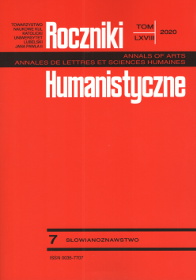Elementy folkloru słowiańskiego w powieści Andrieja Rubanowa Финист ясный сокол
Elements of the Slavic Folklore in the Andrei Rubanov’s Novel Finist Yasnyy Sokol
Author(s): Paulina Wójcikowska-WantuchSubject(s): Language and Literature Studies, Studies of Literature, Russian Literature
Published by: Towarzystwo Naukowe KUL & Katolicki Uniwersytet Lubelski Jana Pawła II
Keywords: Slavic mythology; fairy tale renaissance; fantasy; folklore; oral culture
Summary/Abstract: This article is about the latest novel written by contemporary Russian writer Andrei Rubanov entitled Финист ясный сокол [Finist yasnyy sokol]. The novel was qualified by the author and critics to the Slavic fantasy genre. This genre is gaining more and more popularity among writers and readers on the wave of the Renaissance fairy tale phenomenon in Russian literature at the turn of the 20th and 21st centuries. The plot of the novel by Andrei Rubanov is based on the motifs of Russian folk tales. Constructing the world, the artist presented primarily the texts of Russian folklore, but in order to substantiate the events, he also used ethnographic and historical knowledge about the life of the Early Slavs. The aim of the article was to present and discuss elements of Slavic folklore in the work of Andrei Rubanov. The author of the paper focused on the area of Slavic beliefs: mythology, demonology, pagan rituals and rituals. Elements of Slavic folklore such as the culture of folk laughter and flaw narrative were also presented. One of the basic problems of the novel was pointed out, the disintegration of oral culture and the disappearance of primitive magical thinking in favor of writing culture and Christian worldview.
Journal: Roczniki Humanistyczne
- Issue Year: 68/2020
- Issue No: 7
- Page Range: 65-84
- Page Count: 20
- Language: Polish

